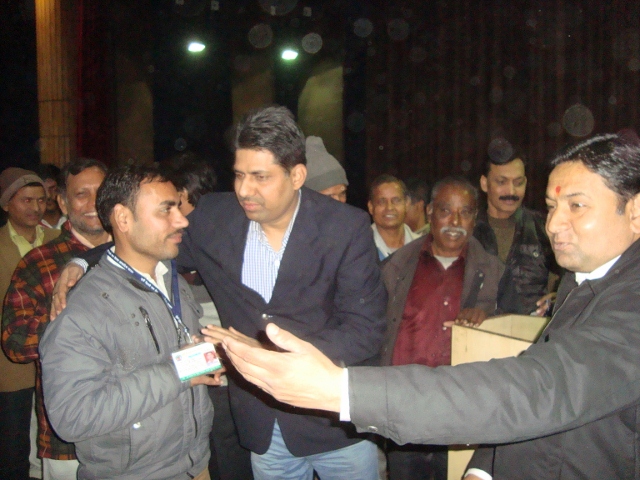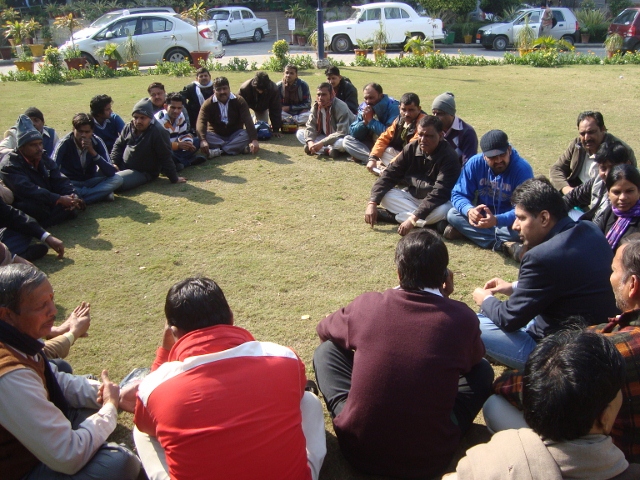Your cart is currently empty!
Day: January 25, 2013
-
The Number of Deaths of Homeless People in India is Rising
According to the United Nations Development Programme’s Homeless Survey 2010 report there are 56,000 homeless in Delhi. At present, Delhi has around 150 night shelters; 84 temporary and 66 permanent. This is significantly less than one night shelter for every one lakh people across Delhi as mandated in Delhi Master Plan 2021. The capacity of these shelters varies from 40 to 200 people. According to the Delhi’s Urban Development Minister, the total capacity of permanent night shelters is 9,400 and the capacity of temporary shelters is 4,200. The Delhi government has earmarked Rs 6 crore for the 2012-13 financial year to construct, manage and maintain shelters in Delhi.
ACORN’s Delhi Partner Janpahal is managing three temporary shelters and one permanent shelter. As Delhi continues to shiver in the grip of a cold wave, we are grappling with the task of providing shelter to the homeless citizens of India. All our shelters are nearly always overcrowded. We are stretched to our limits. Delhi urban Shelter Improvement Board has provided the basic infrastructure of porta cabins with water, power, toilets, blankets, carpets etc. We regularly outreach to homeless citizens to bring them to shelters where we engage them with various kinds of programmes. We provide facilities like locker and first aid and link the homeless patients to nearby hospitals. We also conduct counselling sessions with chemically dependent homeless citizens for drugs de-addiction. Newspapers are available in shelters. Targeted training workshops and awareness building are regular features of the programmes. Since most of the homeless residents are undocumented, we have concerted drive to get them counted in the census and enroll them as voters.
-
Walmart Inquiry
The Union cabinet led by the Prime Minister today approved the one man commission inquiry on Walmart lobbying in India. The inquiry Commission would be set up under the Commission of Inquiry Act, 1951 and would submit its report within three months of its constitution. As per this act it would be obligatory for the Govt. to table the inquiry report and action taken report in the Parliament.
The terms of reference of the Committee are as follows:-
(i) To inquire into recent media reports on disclosures of Wal-Mart before the US Senate regarding their lobbying activities and details.
(ii) Whether Wal-mart undertook any activities in India in contravention of any Indian law.
(iii) Any other matter relevant or incidental to the above.
The Minister meets Walmart CEO
Here is the official statement by Govt of India:
“Mr Doug McMillon, CEO Walmart International met Union Commerce Industry and Textiles Minster Shri Anand Sharma at Davos today and conveyed that Walmart is ‘excited about India’ and they are studying the conditions before making the final announcement.
Shri Sharma said that India’s Policy on FDI in Multi Brand retail has finality and they need not be unduly concerned about any policy reversal. Shri Sharma also asked them to send request for clarification, if any, in the written form to his Ministry. All necessary clarity will be provided, assured Shri Sharma.”
Anger grows as foreign retailers enter India
http://www.dw.de/anger-grows-as-foreign-retailers-enter-india/a-16545485
-
Update on Walmart
The Union cabinet led by the Prime Minister today approved the one man commission inquiry on Walmart lobbying in India. The inquiry Commission would be set up under the Commission of Inquiry Act, 1951 and would submit its report within three months of its constitution. As per this act it would be obligatory for the Govt. to table the inquiry report and action taken report in the Parliament.
The terms of reference of the Committee are as follows:-
(i) To inquire into recent media reports on disclosures of Wal-Mart before the US Senate regarding their lobbying activities and details.
(ii) Whether Wal-mart undertook any activities in India in contravention of any Indian law.
(iii) Any other matter relevant or incidental to the above.
-
Anger Grows as Foreign Retailers Enter India
Swedish furniture manufacturer IKEA is the latest retail store set to expand into India. The government wants to attract much-needed infrastructure – while many shop owners fear for their livelihood.
Praveen Khandelwal’s hardware store in Delhi employs some 15 people. But soon, the shop owner fears, they might all lose their jobs – and with it, their livelihood.
“International companies will grab the entire retail trade,” Khandelwal told DW. He is afraid that there will be no room for small-scale retailers like him. “Foreign companies will rule India!”
For a long time, India had very restrictive rules on Foreign Direct Investment (FDI). But in the last couple of years, restrictions have been loosened. In June, 2012, the government made some changes to its policies, allowing foreign retailers to operate with less restrictions in the country.
This, according to Gareth Price, a Senior Research Fellow at the British think-tank Chatham House, was aimed at building up much-needed infrastructure in particular in the agricultural sector. “India’s supply chain management is very poor. A lot of food is wasted before it even reaches the shops,” Gareth told DW. India, he added, lacked the resources to improve its infrastructure – the reason the ruling Congress Party decided to open the country to foreign investment.
Several foreign companies, including Wal-Mart, were quick to set up shop following the liberalization.
Highly divisive policies
In November, the government went even further, allowing for full ownership of local subsidiaries by foreign companies. Previously, foreign ownership had been limited to 51 percent.
Furniture manufacturer IKEA is the latest international retailer set to expand into India. On Tuesday, January 22, an Indian Commerce Ministry official said that the Investment Board had approved the Swedish company’s 1.9-billion-dollar investment proposal. IKEA announced it planned to open 25 stores in India over the next 15 to 20 years. The Cabinet, however, has yet to approve the bill and some Members of Parliament have already voiced their opposition. The opposition BJP party said that it would reverse the decision after the next elections, Price from Chatham House said.
The issue of foreign investment is highly divisive. Many Indians, Price said, fear that hundreds of thousands of jobs might be lost in the retail sector, one of the biggest employers in India.
“They will spread”
Dharmendra Kumar is one of them. “We’re not so concerned about IKEA,” the social activist with India FDI Watch, told DW. “They only make furniture, they won’t have much impact.” But he is concerned that while so far only a minority of India’s states have passed the FDI laws, others may soon follow suit. “And once they get here, they will spread.”
It was only a matter of time, he added, before foreign companies would start to have an impact on supply chains, dictate prices and force small- and medium-sized producers out of business.
With a little help from abroad
Amita Arora Puri from the All India Artisans and Craftworkers Association takes a less bleak view: IKEA with its “unmatched funds and global expertise” could help local artisans and traders to improve their designs, product quality and production abilities,” Puri told DW.
“The domestic private sector is looking for intellectual property of how foreign firms are doing things,” Price agrees. He added that, given India’s red tape and often excessive bureaucracy, foreign companies might find it hard to operate in India, letting the domestic sector take over. “That would seem a perfectly plausible outcome in the retail sector.”
Or, in one Twitter users’ laconic words: “50 percent of Ikea’s sales in India will be to furniture manufacturers who want to steal their designs.”
But Price doesn’t think that many foreign companies will commit themselves to India just yet, given the political opposition to the liberalization move. After all, he told DW, the opening was “reversible.”
Shop owner Praveen Khandelwal, for one, isn’t planning to wait and see. He wants to take his fear to the streets. “We’re working on a campaign against the foreign retailers,” he told DW, referring to a group of shop owners and retailers. “Just wait.”
http://www.dw.de/anger-grows-as-foreign-retailers-enter-india/a-16545485
-
Retail FDI: How will you Protect Small Traders, Supreme Court asks Government
The Supreme Court today said that interest of small retail traders should not be affected due to foreign direct investment (FDI) in retail sector and sought response from the Centre on how it intends to safeguard their interests.
A bench headed by Justice R M Lodha asked the Centre to file its response within three weeks.
“What checks are there to ensure that free trade is not affected, particularly the interest of small traders,” the bench said while hearing a public interest litigation (PIL).
“Apprehension is there in the mind of people that small traders’ interest would be affected,” the bench said, adding, “Some regulatory measures should be there.”
http://www.indianexpress.com/news/retail-fdi-how-will-you-protect-small-traders-supreme-court-asks-govt/1063049/
-

Hawker ID Cards
East Delhi Municipal Corporation on Jan 21, 2013 inaugurated the Identity card distribution to hawkers of Weekly markets. Mr. Sunil Jha, Chairman, Licensing and Tehbazaari Committee, EDMC distributed the I cards to hawkers at the program organized at EDMC headquarter. The Hon’ble Mayor, Standing Committee Chairman, Leader of the House, Leader of the opposition and many of the Councillors were also present on the occasion.
We held a meeting of hawkers in the EDMC park.


